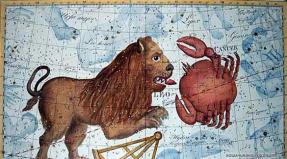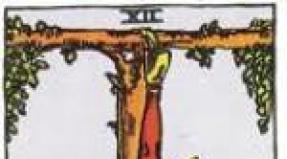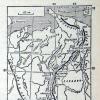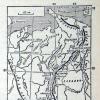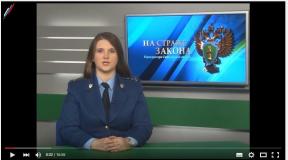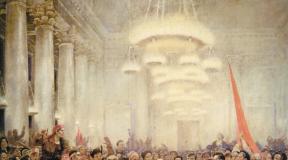Karamzin history of the Russian state of Troubles. Nikolai karamzin. Extract from history from the beginning of the kingdom of tsar theodore joannovich
SELF-DESIGNATION. In the unreasonable course of action of the government and society, so sadly supported by nature itself, such a disorder was revealed public relations, such a social disorder, which, after the suppression of the dynasty, was difficult to cope with by ordinary government means. This second cause of the Troubles, socio-political, in conjunction with the first, dynastic, strongly, albeit indirectly, supported the Troubles by aggravating the effect of the first, which was expressed in the successes of the impostors. Therefore, imposture can also be recognized as a derivative cause of the Troubles, emerging from the combined action of both root. The question of how the very idea of imposture could have arisen does not involve any kind of popular psychological difficulty. The mystery surrounding the death of Tsarevich Dimitri gave rise to contradictory rumors, from which the imagination chose the most desirable, and most of all, they wished for a successful outcome, so that the prince would be alive and eliminate the painful uncertainty that clouded the future. They were disposed, as always in such cases, to unaccountably believe that the villainy had failed, that Providence this time stood guard over the world truth and prepared retribution for the villains. The terrible fate of Tsar Boris and his family was in the eyes of the alarmed people a striking revelation of this eternal truth of God, and of all, it helped the success of imposture. The moral sense found support in a political instinct, as much unaccountable as accessible to the masses in its unaccountability. Imposture was the most convenient way out of the struggle of irreconcilable interests, agitated by the suppression of the dynasty: it mechanically, forcibly united under the usual, albeit counterfeit, power the elements of a society ready to disintegrate, between which an organic, voluntary agreement had become impossible.
CONCLUSIONS. This is how the origin of the Troubles can be explained. The basis for it was the painful mood of the people, the general feeling of discontent brought by the people from the reign of Grozny and intensified by the rule of B. Godunov. The reason for the Troubles was given by the suppression of the dynasty, followed by attempts to artificially restore it in the person of impostors. The root causes of the Troubles must be recognized as the popular view of the attitude of the old dynasty to the Muscovite state, which made it difficult to get used to the idea of an elective tsar, and then the very structure of the state with its heavy draft basis and uneven distribution of state duties, which gave rise to social discord: the first reason caused and supported the need to resurrect a lost royal family, and this need ensured the success of imposture; the second reason turned dynastic intrigue into socio-political anarchy. The turmoil was also facilitated by other circumstances: the way of action of the rulers who became the head of state after Tsar Fyodor, the constitutional aspirations of the boyars that ran counter to the character of the Moscow supreme power and the popular view of it, the low level of public morality, as depicted by modern observers, boyar disgraces, famine and pestilence in the reign of Boris, regional strife, the intervention of the Cossacks. But all these were not causes, but either only symptoms of the Troubles, or the conditions that nourished it, but did not give rise to it, or, finally, the consequences that it itself caused to act.
Trouble is at the turn of two adjacent periods of our history, connected with the previous one by its causes, with the subsequent one by its consequences. The end of the Troubles was laid by the accession to the throne of the tsar, who became the founder of a new dynasty: this was the first immediate consequence of the Troubles.
SECOND SUPPORT. At the end of 1611 the Moscow state presented a spectacle of complete visible destruction. The Poles took Smolensk; a Polish detachment burned down Moscow and fortified itself behind the surviving walls of the Kremlin and China-city; the Swedes occupied Novgorod and nominated one of their princes as a candidate for the Moscow throne; to replace the killed second False Dmitry in Pskov, a third, some Sidorka, sat down; the first noble militia near Moscow was upset with the death of Lyapunov. Meanwhile, the country was left without a government. The Boyar Duma, which became its head after the deposition of V. Shuisky, was abolished by itself when the Poles seized the Kremlin, where some of the boyars sat down with their chairman, Prince. Mstislavsky. The state, having lost its center, began to disintegrate into its component parts; almost every city acted separately, only communicating with other cities. The state was transformed into some formless, restless federation. But from the end of 1611, when the political forces were exhausted, religious and national forces began to awaken, which went to the rescue of the perishing land. The letters of invitation of Archimandrite Dionysius and the cellarer Avraamy, which were dispersed from the Trinity Monastery, raised the citizens of Nizhny Novgorod under the leadership of their head butcher Kuzma Minin. At the call of the Nizhny Novgorod citizens, servicemen, city noblemen and boyar children, who were left without work and salaries, and often without estates, began to flock to Minin, whom Minin found the leader, Prince Dmitry Mikhailovich Pozharsky. So the second noble militia was formed against the Poles. In terms of fighting qualities, it did not stand above the first, although it was well equipped thanks to the abundant monetary treasury, selflessly collected by the townspeople of Nizhny Novgorod and other cities that joined them. For about four months, the militia settled, for six months it moved to Moscow, replenished along the way with crowds of service people who asked to be accepted on the zemstvo salary. Near Moscow was a Cossack detachment of Prince. Trubetskoy, the remnant of the first militia. Cossacks were more terrible for the Zemstvo noble army than the Poles themselves, and on the proposal of Prince. Trubetskoy, she replied: "We do not melt together with the Cossacks." But it soon became clear that nothing could be done without the support of the Cossacks, and in the three months of anchorage near Moscow, nothing important was done without them. In rati pr. Pozharsky, there were more than forty initial people, all with well-born service names, but only two people did big things, and even those were not service people: this is the monk A. Palitsyn and the meat merchant K. Minin. The first, at the request of the book. Pozharsky at the decisive moment persuaded the Cossacks to support the nobles, and the second begged from Prince. Pozharsky 3-4 companies and with them made a successful attack on the small detachment of Hetman Khotkevich, who was already approaching the Kremlin with food supplies for the starving compatriots there. Minin's bold onslaught encouraged the noble militias, who forced the hetman to retreat, already prepared by the Cossacks. In October 1612, the Cossacks took Kitay-Gorod by attack. But the zemstvo militia did not dare to storm the Kremlin; a handful of Poles sitting there surrendered on their own, driven to cannibalism by hunger. The Cossack atamans, and not the Moscow governors, repulsed King Sigismund from Volokolamsk, who was heading for Moscow in order to turn it into Polish hands, and forced him to return home. state responsibility.
CHOICE OF MICHAEL. The leaders of the zemstvo and Cossack militias, the princes Pozharsky and Trubetskoy, sent out summons to all cities of the state calling to the capital the spiritual authorities and elected people from all ranks for the zemstvo council and state election. At the very beginning of 1613, elected representatives of the whole land began to come to Moscow. We will see later that this was the first indisputably all-estates Zemsky Sobor with the participation of townspeople and even rural inhabitants. When the elected officials gathered, a three-day fast was appointed, which the representatives of the Russian land wanted to cleanse themselves of the sins of the Time of Troubles before committing such an important deed. At the end of the fast, meetings began. The first question raised at the council, whether to elect a tsar from foreign royal houses, was decided negatively, sentenced: neither the Polish, nor the Swedish prince, nor other German faiths and from any non-Orthodox states should be elected to the Muscovite state, as well as "Marina's son." This verdict destroyed the plans of the supporters of the prince Vladislav. But choosing your natural Russian sovereign was not easy. Monuments close to that time depict the course of this case at the cathedral in not light colors. There was no unanimity. There was great excitement; each wanted to do according to his own thoughts, each spoke for his own; some suggested this, others this, they all contradicted; they figured out who to choose, went through great genera, but they could not agree on anyone and so they lost many days. Many noblemen and even noblemen bribed voters, sent them with gifts and promises. Upon the election of Mikhail, the conciliar deputation, asking the nun-mother to bless her son for the kingdom, to her reproach that the people of Moscow had “become cheated”, replied that now they were “punished,” taught a lesson, brought up their senses, and joined the union. The conciliar intrigues, intrigues and strife did not at all justify the complacent assurances of the conciliar ambassadors. The cathedral broke up into parties between the noble seekers, of whom the later news called the princes Golitsyn, Mstislavsky, Vorotynsky, Trubetskoy, Mikh. F. Romanov. Himself, modest in his fatherland and character, Prince Pozharsky also, they said, was looking for the throne and spent a lot of money on intrigues. The most serious candidate for ability and nobility, Vol. V.V. Golitsyn, was in Polish captivity, Prince. Mstislavsky refused; there was no one to choose from the rest. The Moscow state emerged from the terrible Troubles without heroes; he was taken out of trouble by kind, but mediocre people. Book. Pozharsky was not Boris Godunov, and Mikhail Romanov was not a prince. Skopin-Shuisky. With a lack of real strength, the matter was decided by prejudice and intrigue. While the cathedral was breaking up into parties, not knowing whom to choose, one after another "writings", petitions for Mikhail from nobles, great merchants, from the cities of the Seversk land and even from the Cossacks, were sent to it; the latter decided the matter. Seeing the weakness of the noble army, the Cossacks raged in Moscow, liberated by them, did what they wanted, without being embarrassed by the interim government of Trubetskoy, Pozharsky and Minin. But in the matter of the Tsar's election, they declared themselves patriots, resolutely rebelled against the Tsar from among foreigners, planned, "tried on" real Russian candidates, a child, the son of a Tushinsky thief, and Mikhail Romanov, whose father Filaret was a protege of both impostors, received the rank of metropolitan from the first and proclaimed patriarch in the second camp near Moscow. The main support of imposture, the Cossacks, naturally, wanted to see on the Moscow throne either the son of their Tushino king, or the son of their Tushino patriarch. However, the thief's son was put to the competition frivolously, more out of Cossack decency, and the Cossacks did not insist on this candidate when the Zemsky Sobor rejected him. By himself, Mikhail, a 16-year-old boy, who did not stand out in any way, could have few views on the throne, and, however, such hostile forces as the nobility and the Cossacks converged on him. This unexpected agreement was reflected in the council as well. In the midst of the struggle of the parties, some nobleman from Galich, from where the first impostor was produced, submitted a written opinion at the council, in which he stated that M.F. ... Many members of the council were against Michael, although he had long been considered a candidate and was pointed out by Patriarch Hermogenes as a desirable successor to Tsar V. Shuisky. The written opinion of the Galician city nobleman irritated many. Angry voices rang out: who brought such a scripture, from where? At this time, the Don chieftain stood out from the ranks of the elective and, approaching the table, also put a scripture on it. "What scripture did you submit, chieftain?" - asked his book. D. M. Pozharsky. “About the natural tsar Mikhail Fedorovich,” answered the ataman. This ataman allegedly decided the matter: “I read the ataman’s scripture and everyone agrees and has one mind of advice,” as one writer of everyday life writes. Michael was proclaimed king. But this was only a preliminary election, only outlining a conciliar candidate. The final decision was given directly to the entire land. Loyal people were secretly sent to the cities to find out the opinion of the people, whom they want to be the sovereign of the Muscovite state. The people were already prepared enough. The messengers returned with a report that all people, young and old, had the same idea: to be sovereign to M.F. This secret police inquiry, combined, perhaps, with agitation, became a kind of electoral plebiscite for the cathedral. On this solemn day, the week of Orthodoxy, the first Sunday of Great Lent, February 21, 1613, the final elections were called. Each rank submitted a special written opinion, and in all opinions one name was listed - Mikhail Fedorovich. Then several clergymen, together with the boyar, were sent to Red Square, and no sooner had they from the Execution Ground asked the crowd of people who had been gathered in the tsar, when they all shouted: "Mikhail Fedorovich."
Nikolay Mikhailovich Karamzin
"History of Russian Goverment"
The reign of Boris Godunov. 1598-1604 g.
Moscow meets the Tsar. Oath to Boris. Cathedral charter. Borisov's activities. Solemn entrance to the capital. The famous militia. Khan Embassy. Treating the troops. Patriarch's speech. Addition to the electoral letter. Royal wedding. Graces. New Tsar Kasimovsky. Incidents in Siberia. Death of Kuchyum. Foreign Policy Matter. The fate of the Swedish Prince Gustav in Russia. Truce with Lithuania. Relations with Sweden. Close connection with Denmark. Duke of Denmark, Xenia's fiancé. Negotiations with Austria. Persian Embassy. Incidents in Georgia. Disaster of Russians in Dagestan. Friendship with England. Hansa. Embassy of Rome and Florence. Greeks in Moscow. Nogai affairs. Internal affairs. Certificate of Merit to the Patriarch. Peasants Law. Drink houses. Borisov's love for enlightenment and for foreigners. A word of praise to Godunov. Borisov's ardor for his son. The beginning of disasters.
The clergy, Synclitus and government officials, with the banners of the Church and the fatherland, with the sound of all the bells of Moscow and the exclamations of the people intoxicated with joy, returned to the Kremlin, having already given the Autocrat to Russia, but still leaving him in his cell. On February 26, 1598, on Cheesecake Week, Boris entered the capital: he was met before the walls of a wooden fortress by all the guests of Moscow with bread, silver, gold, sables, pearls and many other cups. gifts of the Tsar, he kindly thanked them, but did not want to take anything but bread, saying that wealth in the hands of the people is more pleasant to him than in the treasury. Job and all the Clergy greeted the guests; for the Clergy, the Synclite and the people. Funeral service in the Church of the Assumption, Patriarch a second time blessed Boris on the State, overshadowing with a cross Of the Life-giving Tree, and the Kliroses sang for many years both to the Tsar and to the entire House of Power: Tsarina Maria Grigorievna, their young son Theodore and daughter Xenia. Then hello to the new Monarch, all Russians; and the Patriarch, raising his hands to heaven, said: “We praise You, Lord: for You did not despise our prayer, you heard the cry and sobbing of Christians, turned their sorrow into joy and gave us a King, whom we asked You day and night with tears! " After the Liturgy, Boris expressed gratitude to the memory of the two main culprits of his greatness: in the Church of St. Michael he fell prostrate before the graves of Ioannov and Theodorov; prayed over the ashes of the most ancient famous crowned heads of Russia: Kalita, Donskoy, John III, may they be his heavenly accomplices in the earthly affairs of the Kingdom; went into the palace; visited Job at the Chudovskaya monastery; talked with him for a long time in private; told him and all the Bishops that he could not leave Irina in her grief until the Bright Resurrection of Christ, and returned to the Novodevichy Convent, instructing the Boyar Duma, with his knowledge and permission, to manage state affairs.
Meanwhile, all the people serving zealously kissed the cross in fidelity to Boris, some in front of the glorious Vladimir icon of the Virgin Mary, others at the tomb of the saints Metropolitans Peter and Jonah: they swore not to betray the Tsar either in deed or in word; do not intend on the life or health of the sovereign, do not harm him with any poisonous potion or sorcery; not to think about the enthronement of the former Grand Duke of Tver Simeon Bekbulatovich or his son; have no secret relations with them, no correspondence; inform about any osprey and conspiracies, without pity for friends and neighbors in this case; not to go to other lands: to Lithuania, Germany, Spain, France or England. In addition, Boyars, officials Dumnye and Ambassadors pledged to be modest in matters and secrets of the state, judges not to mislead in litigation, treasurers not to take advantage of the Tsar's property, Clerks not to covet. They sent letters in the field of letters announcing the happy election of the Emperor, ordered them to be read publicly, ring the bells for three days and pray in churches first about Tsarina-Inokin Alexander, and after about her sovereign brother, his family, the Boyars and the army. The Patriarch (March 9) By the Council ordered to solemnly ask God, may he vouchsafe the Blessed Tsar to put on himself a crown and purple; set for ever and ever to celebrate in Russia February 21, the day of Borisov accession to the throne; finally proposed to the Zemskaya Duma to approve the oath given to the Monarch by the Cathedral's letter, with the obligation for all officials not to evade any service, not to demand anything from above the dignity of birth or merit, to always and in everything obey Tsarsky's decree and Boyarsky's verdict, to in the affairs of the category and zemstvo not to bring the sovereign to the kruchina... All members of the Great Duma answered unanimously: "We make a vow to lay down our souls and heads for the Tsar, Tsarina and their children!" They ordered to write the charter, in this sense, to the first letters of Russia.
This extraordinary matter did not interfere with the course of ordinary affairs of state, which Boris was engaged in with excellent zeal both in the cells of the monastery and in the Duma, often coming to Moscow. They did not know when he found time to calm down, for sleep and for a meal: they constantly saw him in council with the Boyars and with the Clerks, or beside unfortunate Irina, comforting and grieving day and night. It seemed that Irina really needed the presence of a single person still dear to her heart: smitten by the death of her husband, sincerely and tenderly loved by her, she yearned and cried inconsolably to the point of exhaustion, obviously fading away and already bearing death in her chest, tormented by sobs. The saints, the Nobles in vain urged the Tsar to leave the monastery that was sad for him, to move with his wife and children to the Kremlin chambers, to reveal himself to the people in the crown and on the throne: Boris replied: “I cannot part from the great empress, my unfortunate sister,” and even again, tireless in hypocrisy, he insisted that he did not want to be King. But Irina for the second time ordered to him to fulfill the will of the people and of God, to accept the scepter and to reign not in the cell, but on the throne of Monomakh. Finally, on April 30, the capital moved to meet the Emperor!
This day belongs to the most solemn days of Russia in its history. At one in the morning, the clergy with crosses and icons, the Synclitus, the court, orders, the army, all the citizens were waiting for the Tsar at the stone bridge, near the church of St. Nicholas of Zaraysk. Boris rode from the Novodevichy Convent with his family in a magnificent chariot: when he saw the church banners and the people, he left: he bowed to the holy icons; graciously greeted everyone, both noble and ordinary; introduced them to the Tsarina, long known for her piety and sincere virtue - her nine-year-old son and sixteen-year-old daughter, the beauty of Angels. Hearing the exclamation of the people: "You are our Sovereigns, we are your subjects," Theodore and Xenia, together with their father, caressed officials and citizens; just as he, having taken bread and salt from them, rejected the gold, silver and pearls offered to them as a gift, and called everyone to dine with the King. Unselected, crowded by an innumerable crowd of people, Boris followed the Clergy with his wife and children, like a good father of a family and people, to the Church of the Dormition, where the Patriarch placed the Life-giving Cross of St. Peter the Metropolitan on his chest (which was already the beginning of the Royal wedding) and third time blessed him on the Great State of Moscow. After listening to the Liturgy, the new Autocrat, escorted by the Boyars, went around all the main churches in the Kremlin, everywhere he prayed with warm tears, everywhere he heard the joyful cry of citizens and, holding the hand of his young heir, and with the other leading the lovely Xenia, entered the royal chambers with his wife. On this day, the people dined with the Tsar: they did not know the number of guests, but everyone was invited, from the Patriarch to the beggar. Moscow did not see such luxury in John's time either. - Boris did not want to live in the rooms where Theodore died: he occupied that part of the Kremlin chambers where Irina lived, and ordered to attach a new wooden palace to them.
Karamzin Nikolay Mikhailovich
Karamzin Nikolai Mikhailovich (1766-1826) - Russian writer and historian. Born on December 1 (12), 1766 in the village of Mikhailovna, Simbirsk province, in the family of a retired army officer. At the age of 14, he began to study at the Moscow private boarding school of Professor Shaden. After graduating in 1783, he came to the Preobrazhensky regiment in St. Petersburg. Having retired with the rank of second lieutenant in 1784, Karamzin moved to Moscow, where he became one of the active participants in the journal Children's Reading for Heart and Mind, published by N.I. Novikov, and became close to the Freemasons. He took up translations of religious and moralistic works. Since 1787 he regularly published his translations of Thomson's Seasons, Village Evenings» Jeanlis, tragedies by W. Shakespeare "Julius Caesar", tragedies of Lessing "Emilia Galotti».
Several years later, Karamzin founded the Moscow Journal» (1791-1792) - a literary and artistic periodical, which published the works of contemporary Western European and Russian authors. The story "Poor Liza» (1792) brought him immediate recognition. In the 1790s, he was the head of Russian sentimentalism, as well as the inspirer of the movement for the emancipation of Russian prose, which was stylistically dependent on the Church Slavonic liturgical language. Gradually, his interests shifted from the field of literature to the field of history. After the accession to the throne in 1801 by Emperor Alexander I, he founded a new journal, Vestnik Evropy (1802–1830), the first of numerous Russian literary and political review magazines. In 1804, he resigned from the post of editor, accepted the post of imperial historiographer and began to create a "History of the Russian State". When writing this work, numerous primary sources were used, previously ignored. Some of them have been lost and have not reached us. The first eight volumes were published in 1818 « Stories» – the greatest scientific and cultural feat of Karamzin. In 1821 the 9th volume, dedicated to the reign of Ivan the Terrible, was published, in 1824 the 10th and 11th volumes about Fyodor Ioannovich and Boris Godunov. Death interrupted work on the 12th volume. It happened on May 22 (June 3 NS) 1826 in St. Petersburg.
This text is an introductory fragment. From the book Fornication in Russia (Through the Lips of the People) - 1997 the author Manakov AnatolyLITERARY VERSIONS NIKOLAY KARAMZIN Legends of the Ages (fragment) After hearing the paper about the crimes of Adashev and Sylvester, some of the judges announced that these villains had been caught and deserved to be executed; others, with downcast eyes, were silent. Here the elder, Metropolitan Macarius,
the author From the book of 100 great Russians the author Ryzhov Konstantin Vladislavovich From the book History of Russian Literature XIX century. Part 1. 1800-1830s the author Lebedev Yuri Vladimirovich From the KGB book. Chairmen of the state security bodies. Declassified destinies the author Mlechin Leonid MikhailovichChapter 20 NIKOLAI MIKHAILOVICH GOLUSHKO One of the candidates for the post of Minister of Security instead of Barannikov was journalist Mikhail Nikiforovich Poltoranin, who was then close to the president, former editor of Moskovskaya Pravda, deputy, minister of press and information, deputy prime minister
From the book Great Russian Historians about the Time of Troubles the author Klyuchevsky Vasily OsipovichNikolay Karamzin
From the book From the first prosecutor of Russia to the last prosecutor of the Union the author"STRONG BOLSHEVIK" The Prosecutor of the Republic Nikolai Mikhailovich Rychkov Nikolai Mikhailovich Rychkov was born on November 20, 1897 in the village of Belokholunitskiy Zavod, Slobodskoy Uyezd, Vyatka Province, into a simple working-class family. His father, Mikhail Rychkov, the son of a serf, with
From the book From the KGB to the FSB (instructive pages of Russian history). book 1 (from the KGB of the USSR to the MB RF) the author Strigin Evgeny Mikhailovich From the book History of Humanity. Russia the author Khoroshevsky Andrey YurievichPrzhevalsky Nikolai Mikhailovich (Born in 1839 - died in 1888) An outstanding Russian traveler, explorer of Central Asia. He was the first to describe the nature of many of its regions, discovered a number of ridges, depressions and lakes in Kunlun, Nanshan and the Tibetan plateau. Major General. His
From the book From the KGB to the FSB (instructive pages of Russian history). Book 2 (from MB RF to FGC RF) the author Strigin Evgeny MikhailovichNikolay Mikhailovich Golushko Biographical information: Nikolay Mikhailovich Golushko was born in 1937 in Kazakhstan. Higher education, in 1959 he graduated from the law faculty of Tomsk State University. He worked in the prosecutor's office, then in the bodies
From the book Soviet Aces. Essays on Soviet pilots the author Bodrikhin Nikolay GeorgievichSkomorokhov Nikolai Mikhailovich Received the baptism of fire in 1942, jr. sergeant, Skomorokhov went through the entire war, ended it as a major, a Hero, who soon became twice, won 46 personal victories, did not lose a single aircraft in battle, did not receive a single wound ...
From the book St. Petersburg. Autobiography the author Kirill Mikhailovich KorolevThe Legend of the "Cursed City", 1811 Nikolai Karamzin, Vissarion Belinsky, Dmitry Merezhkovsky The legend of the prophecy predicting: "Petersburg will be empty" is widely known. One of the versions ascribes these words to the first wife of Peter the Great, who was exiled by him to a monastery.
the author Zvyagintsev Alexander GrigorievichNikolai Mikhailovich Janson (1882–1938) "A good, wonderful past ..." At the end of the 19th century, not only Russian workers, but also immigrants from the Baltic peoples flocked to St. Petersburg, the largest industrial center of the North-West of Russia. In the family of one of them, an Estonian, a native of the island
From the book Life and Deeds of Prominent Russian Lawyers. Ups and downs the author Zvyagintsev Alexander GrigorievichNikolai Mikhailovich Rychkov (1897-1959) "Strong Bolshevik" Nikolai Mikhailovich Rychkov was born on November 20, 1897 in the village of Belokholunitsky plant, Slobodsky district, Vyatka province, into a simple working-class family. His father, Mikhail Rychkov, the son of a serf, with
From the book Internal Troops. History in faces the author Shtutman Samuil MarkovichBYSTRYKH Nikolai Mikhailovich (01/26/1893–2/23/1939) Head of the Main Directorate of Border Guard and OGPU Troops of the USSR (07/30/1931–08.04.1933) 3rd Rank State Security Commissioner (12/11/1935) Born into the family of a worker at the Motovilikhinsky Plant of the Perm Province ... (Father after 40 years became
From the book Russian explorers - the glory and pride of Russia the author Glazyrin Maxim YurievichPrzhevalsky Nikolai Mikhailovich Przhevalsky Nikolai Mikhailovich (1839-1888), Russian traveler, explorer of Central Asia, major general. 1866. N.M. Przhevalsky voluntarily transferred from Warsaw, where he was a teacher at the school of cadets, to the Far East, where
Send your good work in the knowledge base is simple. Use the form below
Students, graduate students, young scientists who use the knowledge base in their studies and work will be very grateful to you.
Posted on http://www.allbest.ru/
Introduction
Chapter 1. XVIII century. V.N. Tatishchev, M.M. Shcherbatov
Chapter 2. N.M. Karamzin
Chapter 3. The first half of the 19th century. CM. Soloviev, N.I. Kostomarov
Chapter 4. Second half of the 19th century. IN. Klyuchevsky. P.N. Milyukov. S.F. Platonov
Conclusion
Bibliography
Introduction
The deepest crisis that gripped all spheres of the life of Russian society at the beginning of the 17th century. and resulting in a period of bloody conflicts, the struggle for national independence and national survival was called by contemporaries "Troubles". The concept of "Troubles" entered historiography from the popular lexicon, meaning anarchy and extreme disorder of social life. In Russia, at the turn of the 16th-17th centuries, the “troubles” affected the economy, domestic and foreign policy, ideology and morality.
This meant "confusion of minds", i.e. a sharp change in moral and behavioral stereotypes, accompanied by an unprincipled and bloody struggle for power, an outburst of violence, movement of various strata of society, foreign intervention, etc., which put Russia on the brink of a national catastrophe.
In the last quarter of the 16th century. in Russia there was a sharp exacerbation of the deep socio-political crisis that had emerged in the previous period. The situation in the country was aggravated by the unfolding power struggle under the successors of Ivan the Terrible. The energetic measures taken by the government of Boris Godunov made it possible to mitigate the crisis only temporarily, but could not ensure its overcoming, for they were carried out at the expense of increasing feudal-serf oppression.
Contemporaries were very keenly aware of the acuteness of the events of the late 16th and especially the early 17th centuries. This time has long been designated by the term "Lithuanian ruin". A few decades later, the Moscow clerk Grigory Kotoshikhin, who fled to Sweden, in his description of the Moscow state "On Russia in the reign of Alexei Mikhailovich" first used the term "Times of Troubles", firmly established in pre-revolutionary historiography. Despite extensive coverage in historiography, no generalizing work on the causes of the Time of Troubles has been created, which actualizes this study.
So, the topic of the work is “ Russia is on the verge of turmoil. Causes and prerequisites "- is actual.
Problem term paper: Russia on the eve of Troubles.
Coursework object: historiography of the Troubles.
Coursework subject: how the views of historians of the 18th-19th centuries on the causes and preconditions of the Troubles developed.
Targetterm paper - consider the historiography of the Troubles from the point of view of various authors.
Coursework objectives:
1. Consider the views of V.N. Tatishchev and M.M. Shcherbatov on Troubles;
2. Investigate the views of N.М. Karamzin on the causes and preconditions of the Troubles.
3. Analyze the opinion of historians of the public school about the causes and preconditions of the Troubles.
4. Investigate the views of V.O. Klyuchevsky, P.N. Milyukova, S.F. Platonov on the causes and preconditions of the Troubles.
Research methods- analysis, synthesis, comparative analysis of literature.
Scientists have differently explained the causes and nature of these tragic events.
N.M. Karamzin drew attention to the political crisis caused by the suppression of the dynasty at the end of the 16th century. and the weakening of the monarchy.
CM. Soloviev saw the main content of the Time of Troubles in the struggle of the state principle against the anarchy represented by the Cossacks.
More A complex approach was inherent in S.F. Platonov, who defined it as a complex interweaving of actions and aspirations of various political forces, social groups, as well as personal interests and passions, complicated by the intervention of external forces.
In Soviet historical science, the concept of "Troubles" was rejected, and the events of the beginning of the 17th century. characterized as "the first peasant war, which has an anti-serfdom orientation, complicated by the internal political struggle of feudal groups for power and the Polish-Swedish intervention."
Structure term paper: the work consists of an introduction, 4 chapters and a conclusion.
historiography political turmoil
Chapter 1.HistoriansXVIII centurybut about the Troubles... V.N. Tatishchev, M.M. Shcherbatov
Before starting to consider the views of historians of the XVIII-XIX centuries on the causes of the Troubles, let us dwell briefly on the situation at the end of the XVI-early. XVII centuries. In the last quarter of the 16th century. in Russia there was a sharp exacerbation of the deep socio-political crisis that had emerged in the previous period. The situation in the country was aggravated by the unfolding power struggle under the successors of Ivan the Terrible. The energetic measures taken by the government of Boris Godunov made it possible to mitigate the crisis only temporarily, but could not ensure its overcoming, for they were carried out at the expense of increasing feudal-serf oppression.
In the XVII century. Russia entered into an atmosphere of a further escalation of the social crisis. The scale and nature of this crisis were already visible to contemporaries. One of them, the English diplomat Fletcher, who visited the Russian state in 1588 on a special mission from Queen Elizabeth, wrote the famous words that “general murmur and irreconcilable hatred” prevailing in Russian society testify that “apparently , it should not end otherwise than civil war". As you know, this historical forecast, made by Fletcher in his work "On the Russian State", published in London in 1591, was brilliantly confirmed by the further development of events.
Late 16th - early 17th centuries were the time of continuation of the process of formation of the multinational centralized state. This process took place under the conditions of the dominance of feudal-serf relations.
At the same time, this process of centralization took place in a tense external struggle with neighboring states - Poland, Lithuania, Sweden. Occupying the entire third quarter of the XVI century. during the Livonian War, this struggle resumed at the beginning of the 17th century. The intervention threatened the preservation of state independence, national existence, which caused the rise of the national liberation movement in the country, which played a huge role in the liberation of Moscow from the interventionists.
By the beginning of the 17th century, the process of the formation of Russian statehood was not fully completed; contradictions accumulated in it, which resulted in a severe crisis. Embracing the economy, and the socio-political sphere, and public morality, this crisis was called "Troubles". The Time of Troubles is a period of actual anarchy, chaos and unprecedented social upheavals.
The concept of "Troubles" came into historiography from the popular lexicon, meaning, first of all, anarchy and the extreme disorder of social life. Contemporaries of the Troubles assessed it as a punishment that befell people for their sins.
Contemporaries were very keenly aware of the acuteness of the events of the late 16th and especially the early 17th centuries. This time has long been designated by the term "Lithuanian ruin". A few decades later, the Moscow clerk Grigory Kotoshikhin, who fled to Sweden, in his description of the Moscow state "On Russia in the reign of Alexei Mikhailovich" first used the term "Times of Troubles", firmly established in pre-revolutionary historiography. Let's start our analysis of views on the Troubles with historians of the 18th century.
The historiography of the Time of Troubles is extensive. The chronicle tradition had a certain influence on the views of noble historians. In particular, V.N. Tatishchev looked for the causes of the Troubles in the "insane strife of noble gentry families." Footnote Researchers rightly believe that V.N. Tatishcheva laid the foundation for the scientific concept of the Troubles.
Vasily Nikitich Tatishchev (1686-1750) came from a noble family. He graduated from the Moscow artillery school, devoting a lot of time to self-education, as a result of which he gained fame as one of the most educated officers of the era. The king drew attention to the educated officer and used him several times in the diplomatic service.
The theoretical basis for the views of V.N. Tatishchev's are the concepts of natural law and the contractual origin of the state. In arguing his views, Tatishchev showed great education and knowledge of both ancient and European thinkers. He repeatedly refers to the works of Plato, Aristotle, Cicero, as well as the works of Greek and Roman historians and repeatedly quotes European thinkers of modern times: Greece, Hobbes, Locke, Pufendorf.
In his reasoning about the origin of the state, the thinker used the hypothesis of a pre-contractual "state of nature" in which the "war of all against all" dominates. Reasonable need of people for each other (Tatishchev was guided by considerations of the division of labor between people) led them to the need to create a state, which he considers as the result of a social contract concluded with the aim of ensuring the safety of the people and "seeking common benefit." Tatishchev tries to introduce historical principles into the formation of the state, arguing that all known human communities arose historically: at first, people entered into a marriage contract, then a second contract arose from it between parents and children, then - masters and servants. Ultimately, families grew and formed whole communities that needed a head, and the monarch became this, subjugating everyone in the same way that a father subdues his children. The result is not one, but several contracts, and their very conclusion, apparently depending on people, is actually predetermined by nature itself.
Analyzing the causes of the Troubles, Tatishchev spoke primarily about the crisis of statehood. However, he was not consistent on this issue. Although he admitted that "before Tsar Fyodor, the peasants were free and lived for whoever they wanted," but at this time in Russia the liberty of the peasants "does not agree with our form of monastic government and the ingrained custom of bondage to change is unsafe", however, a significant softening of conditions is urgently required fortress. The landowner, whom Tatishchev recognized as a party to the contract, he called on to take care of the peasants, to supply them with everything necessary so that they have strong farms, more livestock and all kinds of poultry. He advocated the introduction of a land tax and, in general, insisted that the peasantry be "taxed as much as possible." This point of view is deeply rooted among the Russian noble landowners. The most progressive of them understood the legal insolvency of serfdom, but they were afraid of its destruction and proposed various half-measures that would alleviate the plight of the peasants.
At the same time, he was the first to express the fruitful idea that the "great misfortune" of the early 17th century. was a consequence of the laws of Boris Godunov, which made peasants and slaves unwitting.
Prince M.M. Shcherbatov (1733-1790) was born in Moscow, received an excellent education at home as a child, having mastered several European languages. He began his service in St. Petersburg in the Semenovsky regiment, in which he was enrolled from early childhood. Upon the announcement by Peter III in 1762 of the Manifesto "On the Granting of Liberty and Freedom to the All Russian Nobility", he retired with the rank of captain, became interested in literature and history, wrote a number of works on state studies, legislation, economics and moral philosophy. In 1762 he began writing Russian History and studied it throughout his life. In 1767 Shcherbatov was elected a deputy from the Yaroslavl nobility to the Legislative Commission, before which Catherine II set the task of revising the current legislation and creating a new set of laws. For this Commission, Shcherbatov drew up a draft of the Order of the Yaroslavl nobility and wrote comments on the Great Order of Catherine II.
His largest works on political and legal topics were: "On the Need and Benefit of City Laws" (1759); "Various Discourses on Government" (1760); "Reflections on legislation in general" (1785-1789); and "A Journey to the Land of Ophir of the Swedish Nobleman S.", as well as "On the Damage of Morals" (80s of the 18th century).
MM Shcherbatov did not see any positive changes in the Troubles. He expressed a fruitful idea that the "great misfortune" of the early 17th century. was a consequence of the laws of Boris Godunov, which made peasants and slaves involuntary . If he repeated Tatishchev's thought, specifically mention it. Researchers rightly believe that the observation of M.M. Shcherbatov, like V.N. Tatishcheva laid the foundation for the scientific concept of the Troubles.
The main reason for the Troubles, historians recognize the popular view of the attitude of the old dynasty to the Moscow state, which made it difficult to get used to the idea of an elected tsar. It was this that caused the need to resurrect the deceased royal family and ensured the success of attempts to restore the dynasty artificially, i.e. by imposture. An equally important factor is also the very structure of the state with its heavy draft basis and the uneven distribution of state duties, which gave rise to social discord, as a result of which the dynastic intrigue turned into socio-political anarchy.
The impostors of the Time of Troubles were not the only ones in the history of Russia, with their light hand, imposture in Russia became a chronic disease: in the 17th-18th centuries. a rare reign took place without impostors, and under Peter, for the lack of such, popular rumor turned the real tsar into an impostor. The experience of the Troubles taught that such phenomena in the social system are dangerous and threaten to destabilize, therefore the new government carefully monitored these facts, in every possible way preserving the internal order, restored with great difficulty after the Troubles.
So, historians of the 18th century tried to assess the causes of the Time of Troubles. V.N. Tatishchev, M.M. Shcherbatov saw in the Troubles "insane strife of noble noble families", "popular riot", "debauchery of the Russian people from rabble to nobles", "insane and merciless rebellion." Causes?
N.M. Karamzin called the Troubles "a terrible and absurd affair", the result of "debauchery" prepared by the tyranny of Ivan the Terrible and the lust for power of Boris Godunov, who was guilty of the murder of Dmitry and the suppression of the legitimate dynasty.
Chapter 2. N.M. Karamzinabout the causes of the Troubles
Nikolai Mikhailovich Karamzin (December 1 (12), 1766, family estate Znamenskoye, Simbirsk district, Kazan province (according to other sources - Mikhailovka village (Preobrazhenskoye), Buzuluk district, Kazan province) - May 22 (June 3) 1826, St. Petersburg ) - Russian historian-historiographer, writer, poet. What for?
Nikolai Mikhailovich Karamzin was born on December 1 (12), 1766 near Simbirsk. He grew up in the estate of his father, retired captain Mikhail Yegorovich Karamzin (1724-1783), a middle-ranked Simbirsk nobleman, a descendant of the Crimean Tatar murza Kara-Murza. He was educated at home, from the age of fourteen he studied in Moscow at the boarding house of a professor at Moscow University of Shaden, while attending lectures at the University.
In 1778 Karamzin was sent to Moscow to the boarding school of Moscow University professor I. M. Shaden.
In 1783, at the insistence of his father, he entered the service in the St. Petersburg guards regiment, but soon retired. In time military service include the first literary experiments. After his resignation, he lived for some time in Simbirsk, and then in Moscow. During his stay in Simbirsk, he joined the Masonic lodge of the "Golden Crown", and upon his arrival in Moscow for four years (1785-1789) was a member of the Masonic lodge "Friendly Scientific Society."
In Moscow, Karamzin met with writers and writers: N. I. Novikov, A. M. Kutuzov, A. A. Petrov, participated in the publication of the first Russian magazine for children - "Children's reading for the heart and mind."
Upon his return from a trip to Europe, Karamzin settled in Moscow and began his career as a professional writer and journalist, starting to publish the Moskovsky Zhurnal 1791-1792 (the first Russian literary magazine, in which, among other works of Karamzin, appeared the story that strengthened his fame “ Poor Liza "), then published a number of collections and almanacs: Aglaya, Aonids, Pantheon of Foreign Literature, My Trinkets, which made sentimentalism the main literary movement in Russia, and Karamzin its recognized leader.
Emperor Alexander I, by a personal decree of October 31, 1803, bestowed the title of historiographer to Nikolai Mikhailovich Karamzin; 2 thousand rubles were added to the rank at the same time. annual salary. The title of historiographer in Russia was not renewed after Karamzin's death.
Since the beginning of the 19th century, Karamzin gradually moved away from fiction, and from 1804, being appointed by Alexander I to the post of historiographer, he stopped all literary work, "taking the tonsure of a historian." In 1811 he wrote "A note on the ancient and new Russia in its political and civil relations ”, which reflected the views of the conservative strata of society, dissatisfied with the liberal reforms of the emperor. As his task, Karamzin set out to prove that there was no need to carry out any reforms in the country. His note played an important role in the fate of the great Russian statesman and reformer, chief ideologist and developer of reforms Alexander I Mikhail Mikhailovich Speransky. Which, a year after the "note", the emperor exiled for 9 years to Perm.
"A note on ancient and new Russia in its political and civil relations" also played the role of sketches for the subsequent enormous work of Nikolai Mikhailovich on Russian history. In February 1818, Karamzin released the first eight volumes of the History of the Russian State for sale, the three thousandth circulation of which was sold within a month. In subsequent years, three more volumes of "History" were published, a number of translations of it into the main European languages appeared. The coverage of the Russian historical process brought Karamzin closer to the court and the tsar, who settled him near him in Tsarskoye Selo. Karamzin's political views evolved gradually, and by the end of his life he was a staunch supporter of absolute monarchy.
Nikolai Mikhailovich Karamzin in the "History of the Russian State" tells in detail about the tragic events of the beginning of the 17th century, about the causes of the Great Troubles, its main events and figures. The author devoted more than 60 pages of "History" to the siege of the Trinity - Sergius Monastery in 1610-1610.
Karamzin describes the Time of Troubles as "the most terrible thing in its history." He sees the causes of the Troubles in "the frantic tyranny of the 24 years of the Ioannovs, in the hellish game of Borisov's love of power, in the calamities of ferocious hunger and all-out robberies (bitterness) of hearts, the depravity of the people - everything that precedes the overthrow of states condemned by providence to death or painful rebirth." Thus, even in these lines one can feel the monarchical tendentiousness and religious providentialism of the author, although we cannot blame Karamzin for this, since he is a student and at the same time a teacher of his era. But, despite this, we are still interested in the factual material that he placed in his "History ..." and his views on the "history" of the early 17th century, refracted in the 19th century.
N.M. Karamzin exposes and defends throughout his narrative only the only line of events in which he, apparently, was completely sure: Tsarevich Dmitry was killed in Uglich on the orders of Godunov, who "dreamed of the royal crown in dreams and in reality" and that Tsarevich Dmitry the fugitive monk of the Chudov Monastery named Grigory Otrepiev ( official version Boris Godunov). Karamzin believes that “a wonderful thought” “settled and lived in the soul of a dreamer in the Chudov Monastery, and Lithuania was the way to achieve this goal. The author believes that even then the impostor relied on “the gullibility of the Russian people. Indeed, in Russia the crown bearer was considered an "earthly God".
In The History of the Russian State, Karamzin gives a sharply negative characterization of Boris Godunov as the murderer of Tsarevich Dmitry: “Arrogant in his merits and merits, glory and flattery, Boris looked even higher and with daring lust. The throne seemed to Boris a heavenly place. " Footnote But earlier, in 1801, Karamzin published in the "Bulletin of Europe" an article "Historical memoirs and remarks on the way to the Trinity", which spoke in some detail about the reign of Godunov. At that time, Karamzin still could not unconditionally agree with the version of the murder, he carefully considered all the arguments "for" and "against", trying to understand the character of this sovereign and evaluate his role in history. "If Godunov," the writer reflected, "had not cleared the way to the throne by killing himself, then history would have called him a glorious tsar." Standing at the tomb of Godunov, Karamzin is ready to reject the accusations of murder: “What if we slander these ashes, unjustly torment the memory of a person, believing false opinions that are meaningless or hostile in the chronicle?” In "History ..." Karamzin no longer questions anything, as he follows the tasks set and the order of the sovereign.
But one can be sure of one thing: in the decisive role that the Rzeczpospolita played in the nomination of the "named" Dmitry to the Moscow throne. Here in Karamzin one can discern the idea of concluding a union between the Rzeczpospolita and the Muscovite state: "Never before, after the victories of Stefan Batory, the Rzeczpospolita did not approach the Moscow throne." False Dmitry I, "having an ugly appearance, replaced this disadvantage with liveliness and courage of mind, eloquence, posture, nobility." And, indeed, you need to be smart and cunning enough so that (taking into account all the above versions about the origin of False Dmitry), having come to Lithuania, get to Sigismund and use the border disputes between Boris Godunov and Konstantin Vishnevetsky, “ambition and frivolity” by Yuri Mnisch. "We must do justice to the mind of Razstrichi: having betrayed himself to the Jesuits, he chose the most effective means of enlivening the careless Sigismund with jealousy." Thus, the "named" Dmitry found his support in the secular and the spiritual world Promising all the participants in this adventure what they most wanted: the Jesuits - the spread of Catholicism in Russia, Sigismund III, with the help of Moscow, really wanted to return the Swedish throne. Yuri Mnishka is described by all the authors (not an exception, and N.M. Karamzin) as “a vain and far-sighted person who loved money very much. Giving his daughter Marina, like him an ambitious and windy "marriage to False Dmitry I, he drew up such a marriage contract that would not only cover all Mnisch's debts, but would also provide for his descendants in case of failure of everything planned.
But throughout the entire story of N.M. Karamzin at the same time calls False Dmitry "the most terrible phenomenon in the history of Russia." Footnote
At the same time, "the Moscow government revealed an excessive fear of the Commonwealth for fear that they want to stand for the impostor with all of Poland and Lithuania." And this was the first of the reasons why many princes (Golitsyn, Saltykov, Basmanov), together with the army, go over to the side of False Dmitry. Although here another version arises that all this took place according to the plan of the boyar opposition. Having become tsar, Dmitry "having pleased all of Russia with favors to the innocent victims of Boris's tyranny, tried to please her with common good deeds ...". Footnote Thus, Karamzin shows that the tsar wants to please everyone at once - and this is his mistake. False Dmitry maneuvers between the Polish masters and the Moscow boyars, between the Orthodox and Catholicism, finding himself no zealous adherents either there or there.
After the accession, Dmitry does not fulfill the promises given to the Jesuits, his tone towards Sigismund changes. When, during the stay of the Ambassador of the Polish-Lithuanian Commonwealth in Moscow, “they gave the letters to the tsarist clerk Afanasy Ivanovich Vlasyev, he took it, handed it to the emperor and quietly read his title. It did not say "Caesar". False Dmitry I did not even want to read it, to which the ambassador replied: "You have been seated on your throne with the favor of his royal favor and the support of our Polish people." After that, the conflict was finally settled. Thus, we will subsequently see that Sigismund will leave False Dmitry.
Karamzin also points out that the first enemy of False Dmitry I was himself, "frivolous and quick-tempered by nature, rude from bad upbringing - arrogant, reckless and careless from happiness." He was condemned for strange fun, love for foreigners, some extravagance. He was so confident in himself that he even forgave his worst enemies and accusers (Prince Shuisky is the head of the subsequent conspiracy against False Dmitry).
It is not known what goals False Dmitry pursued by marrying Marina Mnishek: maybe he really loved her, or maybe it was just a clause of the agreement with Yuri Mnishko. Karamzin does not know this, and, most likely, we will not know either.
On May 17, 1606, a group of boyars staged a coup, as a result of which False Dmitry was killed. The boyars rescued the Mnischkov and the Polish lords, apparently by agreement with Sigismund, to whom they spoke about the decision to depose the "tsar" and "perhaps offer the throne of Moscow to Sigismund's son, Vladislav."
Thus, the idea of union reappears, but we know that it is not destined to come true. It can be noted from the above that the whole situation with False Dmitry I is the culmination of the power of the Polish-Lithuanian Commonwealth, the moment when the Commonwealth, under favorable circumstances, could dominate the union with Moscow.
N.M. Karamzin describes the events of the Time of Troubles rather tendentiously, following the state order. He does not aim to show different versions of ambiguous events, and, on the contrary, leads the reader into a story in which the latter should not have a shadow of doubt about what he has read. With his work, Karamzin was supposed to show the power and inviolability of the Russian state. And in order not to plunge the reader into doubts, he often imposes his point of view. And here we can raise the question of the unambiguity of Karamzin's positions when considering the events of the Time of Troubles.
Events at the beginning of the 17th century. occupy a special place in the history of medieval Russia. It was a time of unprecedented contradictions and contrasts in all areas of life, according to researchers, unprecedented contrasts even in comparison with the most acute upheavals of the second half of the 16th century. In the events of the late 16th - early 17th centuries. the angry protest of the people against the famine, the cancellation of St. George's Day, covetousness and arbitrariness, and the heroic defense native land from encroachments by foreign invaders. Why is it here? Put it in the introduction or in the beginning. 1 hl
The position of the Russian land was catastrophic in the first decades of the 17th century, when the unity of the country, achieved at a high price, was destroyed, arose the hardest problem return of Novgorod and Smolensk. It is not necessary.
Chapter 3.Historians of the first half of the XIXcentury about the Troubles. CM. Soloviev. N.I. Kostomarovwhy first
Nikolai Ivanovich Kostomarov (4 (16) May 1817, Yurasovka Voronezh province - 7 (19) April 1885) - public figure, historian, publicist and poet, corresponding member of the Imperial St. Petersburg Academy of Sciences, author of the multivolume publication Russian History in the biographies of its leaders ”, a researcher of the socio-political and economic history of Russia, especially the territory of modern Ukraine, which Kostomarov calls southern Russia and the southern region.
Kostomarov's reputation as a historian, both during his life and after his death, was repeatedly subjected to strong attacks. He was reproached for the superficial use of sources and the resulting errors, for one-sided views, for partisanship. There is a grain of truth in these reproaches, however, very small. Minor blunders and mistakes inevitable for any scientist, perhaps, are somewhat more common in Kostomarov's works, but this is easily explained by the extraordinary variety of his occupations and the habit of relying on his rich memory.
In the few cases when Kostomarov did indeed manifest partisanship - namely, in some of his works on Ukrainian history - this was only a natural reaction against the even more partisan views expressed in literature from the other side. Further, the very material on which Kostomarov worked did not always give him the opportunity to adhere to his views on the task of the historian. The historian of the internal life of the people, according to his scientific views and sympathies, it was in his works dedicated to Ukraine that he was supposed to be a representative of external history.
In any case, the general significance of Kostomarov in the development of Russian and Ukrainian historiography can, without any exaggeration, be called enormous. He introduced and persistently carried out in all his works the idea of folk history. Kostomarov himself understood and implemented it mainly in the form of studying the spiritual life of the people. Later researchers expanded the content of this idea, but this does not diminish Kostomarov's merit. In connection with this, the main idea of Kostomarov's work was another - about the need to study the tribal characteristics of each part of the people and create regional history. If in modern science a slightly different view of the national character was established, denying the immobility that Kostomarov attributed to him, then it was the work of the latter that served as the impetus, depending on which the study of the history of the regions began to develop.
The book of the outstanding Russian historian Nikolai Ivanovich Kostomarov was reproduced from the publication 1904 year and tells about the Time of Troubles, when Russia, finding itself for a certain period without traditional legal authority, fell into a destructive state of internal confrontation and was subjected to external and internal ruin.
“... Our troubled era has not changed anything, has introduced nothing new into the state mechanism, into the system of concepts, into the everyday life of social life, into mores and aspirations, nothing that, flowing out of its phenomena, would move the course of Russian life onto a new path, in a favorable or unfavorable sense for her. A terrible shake-up has drilled everything upside down, inflicted countless calamities on the people; it was not so soon possible to recover after that Rus ... Russian history proceeds extremely consistently, but its rational course seems to skip over the Time of Troubles and then continues its course in the same way, in the same way as before. During the difficult period of the Troubles, there were new phenomena and alien to the order of things that prevailed in the previous period, but they did not recur later, and what seemed to be sown at that time did not increase after. "
N.I. was also engaged in the study of the Troubles. Kostomarov in his work "Time of Troubles in the Moscow State at the beginning of the 17th century." The author shares the version of the murder of Tsarevich Dmitry by order of Boris Godunov. “He was worried about the child Demetrius ... He was born of the eighth wife ... And the son born from such a marriage was not legitimate. At first Boris wanted to take advantage of this circumstance and forbade him to pray for him in churches. In addition, by order of Boris, a rumor was spread with intent that the prince was of an evil disposition and was happy to watch the rams being slaughtered.
But Boris soon saw that this would not achieve the goal: it was too difficult to convince the Moscow people that the tsarevich was illegitimate and therefore could not claim the throne: for the people of Moscow he was still the tsar's son, his blood and flesh. It can be seen that the Russian people recognized Dimitri's right to reign ... Boris, having tried this and that, to remove Dimitri from the future accession, became convinced that it was impossible to arm the Russians against him. There was no other way out for Boris: either to destroy Demetrius, or to wait for death himself from day to day. This man is already accustomed not to stop at the choice of means. " Thus, Dmitry was killed on the orders of Boris Godunov. Here Kostomarov duplicates the version of Karamzin, Soloviev and Klyuchevsky. Consequently, False Dmitry was an impostor, but Kostomarov does not associate the impostor with the name of Grigory Otrepiev. "Since the appearance of Dimitri, Tsar Boris fought against him in the way that could be most beneficial ...: Gradually rumors spread that the newly-minted Dimitri in Poland was Grishka Otrepiev, defrocked, a fugitive monk from the Chudov Monastery." Boris assured everyone that Dmitry was not in the world, and in Poland there was some kind of deceiver and he was not afraid of him. So, according to Kostomarov, Boris did not know the real name of the impostor, and to calm the people began to spread rumors himself. N.I. Kostomarov believes that the place where rumors about the impostor appeared is Polish Ukraine, which at that time was “the promised land of daring, courage, bold undertakings and enterprise. And anyone who would not call himself the name of Dimitri in Ukraine could count on support: further success depended on the ability and ability to conduct business. " The author notes that the intrigue originated in the head of the impostor himself, and notes that "it was a transient Kalika, a wanderer who said that he came out of the Moscow land." The impostor was clever and cunning enough to deceive the Polish nobles and use their desires in relation to Moscow in their own interests. Although the author leaves "the question of whether he (False Dmitry) considered himself a real Dmitry or was a deliberate deceiver" is still unresolved.
N.I. Kostomarov believes that the Rzeczpospolita seized on the impostor with the goal of politically weakening Russia and subordinating it to the papacy. It was her intervention that gave the Troubles such a difficult character and such duration.
Sergei Mikhailovich Solovyov (May 5 (17), 1820, Moscow - October 4 (16), 1879, ibid.) - Russian historian; Professor of Moscow University (since 1848), Rector of Moscow University (1871-1877), ordinary Academician of the Imperial St. Petersburg Academy of Sciences in the Department of Russian Language and Literature (1872), Privy Councilor.
For 30 years Solovyov worked tirelessly on the "History of Russia", the glory of his life and the pride of the Russian historical science... Its first volume appeared in 1851, and since then it has been carefully published year after year. The last, the 29th, came out in 1879, after the death of the author. In this monumental work, Solovyov displayed energy and fortitude, all the more amazing because during the hours of "rest" he continued to prepare many other books and articles of various contents.
Russian historiography, at the time when Solovyov appeared, had already left the Karamzin period, ceasing to see its main task in only one image of the activities of sovereigns and the change of government forms; there was a need not only to tell, but also to explain the events of the past, to grasp the regularity in the successive change of phenomena, to discover the guiding "idea", the main "beginning" of Russian life. Attempts of this kind were made by Polevoy and the Slavophiles as a reaction to the old direction, personified by Karamzin in his History of the Russian State. In this regard, Solovyov played the role of a conciliator. The state, he taught, being a natural product of the life of the people, is the people themselves in their development: one cannot be separated from the other with impunity. The history of Russia is the history of its statehood - not the government and its bodies, as Karamzin thought, but the life of the people as a whole. In this definition, one can hear the influence partly of Hegel with his doctrine of the state as the most perfect manifestation of the rational forces of man, partly of Ranke, which emphasized with particular relief the consistent growth and strength of states in the West; but the influence of the factors themselves, which determined the character of Russian historical life, is even greater. The predominant role of the state principle in Russian history was also emphasized before Solovyov, but he was the first to point out the true interaction of this principle and elements of the social. That is why, going much further than Karamzin, Solovyov could not study the continuity of government forms otherwise than in close connection with society and with the changes that this continuity brought into its life; and at the same time, he could not oppose, like the Slavophils, the "state" to the "earth", limiting himself to the manifestations of only one "spirit" of the people. Equally necessary in his eyes was the genesis of both state and social life.
V logical connection with such a formulation of the problem, there is another basic view of Solov'ev, borrowed from Evers and developed by him into a coherent doctrine of family life. The gradual transition of this way of life into the way of life of the state, the successive transformation of tribes into principalities, and principalities - into a single state whole - this, in Solovyov's opinion, is the main meaning of Russian history. From Rurik to the present day, the Russian historian has been dealing with a single integral organism, which obliges him “not to divide, not to split Russian history into separate parts, periods, but to combine them, to follow mainly the connection of phenomena, the direct succession of forms; not to separate the beginnings, but to consider them in interaction, try to explain each phenomenon from internal reasons, before isolating it from the general connection of events and subordinating it to external influence. " This point of view had a tremendous impact on the subsequent development of Russian historiography. Former divisions into eras based on outward signs devoid of internal communication have lost their meaning; they have been replaced by stages of development. "The history of Russia since ancient times" is an attempt to trace our past in relation to the views expressed. Here is a condensed diagram of Russian life in its historical development, expressed, if possible, in my own words Solovyov.
Sergei Mikhailovich Soloviev believed that the reason for the hard times was a bad state of morality, which was the result of a clash of new state principles with old ones, which manifested itself in the struggle of the Moscow sovereigns with the boyars. He saw another reason for the Troubles in the excessive development of the Cossacks with their anti-state aspirations.
This book of the historian covers the events from the beginning of the reign of Fyodor Ioannovich to the liberation of Moscow from foreign invaders and the enthronement of Mikhail Romanov. It also tells about the siege of the Trinity-Sergius Monastery by the Polish-Lithuanian invaders, about the heroism and resilience of the besieged.
On some personal qualities of the impostor S.M. Solovyov responded with sympathy, seeing in him talented person misled by other people seeking to use him for their own political purposes ... “False Dmitry was not a deliberate deceiver. If he was a deceiver, and not a deceived one, what would it cost him to compose the details of his salvation and adventures? But he didn't? What could he explain? The powerful people who set him up, of course, were so careful that they did not act directly. He knew and said that some of the nobles saved him and patronized him, but he does not know their name. " CM. Soloviev was impressed by the benevolent disposition of False Dmitry I, his quick wit in state affairs, and his passionate love for Marina Mnishek. The author was the first among historians to put forward the idea that the boyars, nominating Grigory Otrepiev for the role of an impostor, managed to instill in him the idea of his royal origin so much that he himself believed in that mystification and in his thoughts and actions did not separate himself from Tsarevich Dmitry.
Thus, according to S.M. Soloviev and N.I. Kostomarov, the Troubles began with a boyar intrigue, into which the Commonwealth was drawn, pursuing its own goals, and at the head of this intrigue, playing the role of a puppet, under the name of Dmitry was put Grigory Otrepiev.
Chapter 4. Second half of the 19th century. IN. Kliuchevskith. P.N. Milyukov. S.F. Platonov
Considering the historiography of the Time of Troubles, the St. Petersburg scientist Sergei Fedorovich Platonov should be noted. Of more than a hundred of his works, at least half are devoted to Russian history at the turn of the 16th-17th centuries.
Sergey Fedorovich Platonov (June 16 (28), 1860, Chernigov - January 10, 1933, Samara) - Russian historian, academician of the Russian Academy of Sciences (1920).
According to Platonov, the starting point that determined the peculiarities of Russian history for many centuries to come is the "military character" of the Moscow state, which arose at the end of the 15th century. Surrounded almost simultaneously from three sides by offensive enemies, the Great Russian tribe was forced to adopt a purely military organization and constantly fight on three fronts. The purely military organization of the Moscow state resulted in the enslavement of the estates, which predetermined the internal development of the country for many centuries to come, including the famous "Troubles" of the early 17th century.
The "emancipation" of the estates began with the "emancipation" of the nobility, which received its final form in the "Charter to the Nobility" of 1785. The last act of "emancipation" of the estates was peasant reform 1861 year. However, having received personal and economic freedoms, the "emancipated" estates did not wait for political freedoms, which found expression in "mental fermentation of a radical political nature", which eventually resulted in the terror of the "Narodnaya Volya" and revolutionary upheavals of the early 20th century.
The work of Sergei Fedorovich Platonov analyzes the causes, nature and consequences of the events of the Time of Troubles in the Moscow state of the 16th - 17th centuries.
A story about the second militia led by Minin and Pozharsky, as well as about the moral and patriotic role of the Trinity Monastery during the Time of Troubles. Archimandrite Dionysius played a large role in this activity.
S.F. Platonov believes that "the causes of the Troubles, undoubtedly, flew as much in Moscow society itself as outside it." Regarding the death of Tsarevich Dmitry Platonov, he does not take the side of the official version of the accidental suicide, nor the side of the accuser Boris Godunov of the murder. “Remembering the possibility of the origin of the charges against Boris and considering all the confusing details of the case, it must be said as a result that it is difficult and still risky to insist on Dmitry's suicide, but at the same time it is impossible to accept the prevailing opinion about the murder of Dmitry by Boris ... the circumstances of Dmitry's death. Until they are resolved, the accusations against Boris will be on very shaky ground, and he will not be the accused before us and the court, but only a suspect ... ”.
The author believes that “The impostor was indeed an impostor, and, moreover, of Moscow origin. Embodying the idea that wandered in the minds of Moscow during the tsar's election in 1598 and supplied with good information about the past of the true tsarevich, obviously from well-informed circles. An impostor could achieve success and use power only because the boyars who owned the state of affairs wanted to attract him. " Therefore, S.F. Platonov believes that "in the person of the impostor, the Moscow boyars tried to attack Boris again." Arguing about the identity of the impostor, the author points to various versions of the authors and leaves this question open, but emphasizes the indisputable fact that "Otrepiev participated in this plan: it could easily be that his role was limited to propaganda in favor of the impostor." “It can also be taken as the most correct that False Dmitry I was a Moscow idea, that this figurehead believed in his royal origin and considered his accession to the throne quite correct and honest.”
Platonov does not give her much attention to the role of the Polish-Lithuanian Commonwealth in the impostor intrigue and points out that “on the whole, Polish society was restrained in the impostor's business and was not carried away by his personality and stories ... The best parts of Polish society did not believe the impostor, and the Polish Diet did not believe him either 1605, which forbade the Poles to support the impostor ... Although King Sigismund III did not adhere to those decrees of the Diet, he himself did not dare to openly and officially support the impostor. "
“... Our Troubles are rich in real consequences that have affected our social order, on the economic life of her descendants. If the Muscovite state seems to us the same in its basic outlines as it was before the Troubles, it is because in the Troubles the same State order remained the winner, which was formed in the Moscow state in the 16th century, and not the one that its enemies would have brought us. - Catholic and aristocratic Poland and the Cossacks; living in the interests of predation and destruction, molded into the form of an ugly "circle". The Troubles did not happen by chance, but was the discovery and development of an old disease that Russia had suffered from before. This disease ended with the recovery of the state organism. We see after the crisis of the Troubles the same organism, the same state order. Therefore, we tend to think that the Troubles was only an unpleasant incident with no particular consequences. " - S.F. Platonov "Lectures on Russian History"
“In the Troubles there was a struggle not only political and national, but also social. Not only the pretenders to the Moscow throne fought among themselves and the Russians fought with the Poles and Swedes, but some strata of the population were at enmity with others: the Cossacks fought with the sedentary part of society, tried to prevail over it, build the land in their own way - and could not. The struggle led to the triumph of the sedentary strata, a sign of which was the election of Tsar Mikhail. These strata moved forward, supporting the state order they had saved. But the main figure in this military celebration was the urban nobility, which won the most. The Troubles did him a lot and strengthened his position. The Troubles hastened the process of the rise of the Moscow nobility, which would have been incomparably slower without it. ... As for the boyars, on the contrary, they suffered a lot from the Troubles.
But the above does not exhaust the results of the Troubles. Getting acquainted with the internal history of Russia in the 17th century, we will have to erect every major reform of the 17th century to the Troubles, condition it by it. If we add to this those wars of the 17th century, the need for which arose directly from the circumstances created by the Troubles, then we will understand that the Troubles were very rich in results and by no means constituted such an episode in our history that accidentally appeared and passed without a trace. We can say that the Troubles determined almost all of our history in the 17th century. " - S.F. Platonov "Lectures on Russian history".
Thus, S.F. Platonov rejects Karamzin's categorical attitude towards Boris Godunov as a villain and undoubted killer of Dmitry, and also casts doubt on the identification of the impostor with Otrepiev.
The historian V.O. Klyuchevsky. He notes in his course "Russian History" that False Dmitry I "was only baked in a Polish stove, and leavened in Moscow," indicating that the organizers of the impostor intrigue were Moscow boyars.
Vasily Osipovich Klyuchevsky (January 16 (28), 1841, the village of Voskresenovka, Penza province - May 12 (25), 1911, Moscow) - Russian historian, tenured professor at Moscow University; ordinary academician of the Imperial St. Petersburg Academy of Sciences (over the state) on Russian history and antiquities (1900), chairman of the Imperial Society of Russian history and antiquities at Moscow University, privy councilor.
IN. Klyuchevsky, reflecting on the personality of the impostor, does not categorically assert that it was Otrepiev, as N.M. Karamzin. “... This unknown someone, who took the throne after Boris, arouses great anecdotal interest. His personality still remains mysterious, despite all the efforts of scientists to unravel it. For a long time the opinion prevailed from Boris himself that he was the son of the Galician petty nobleman Yuri Otrepiev, in monasticism Grigory. It is difficult to say whether this Gregory or another was the first impostor. "
The author leaves the question of how the fact that False Dmitry I “... behaved like a legitimate natural king, quite confident in his royal origin” came to be unrevealed. "But how False Dmitry developed such a view of himself, it remains a mystery not so much historical as psychological." Discussing the death of Tsarevich Dmitry in Uglich, V.O. Klyuchevsky notes that "... it is difficult to suppose that this business would have taken place without Boris's knowledge; it was rigged by some overly helpful hand that wanted to do what Boris liked, guessing his secret desires." Thus, it can be noted that, unlike N.M. Karamzin, S.M. Soloviev and V.O. Klyuchevsky were not so categorical in their judgments about the personality of False Dmitry I as Otrepiev. And they believed that the main culprits of the intrigue were the Russian boyars, and not the Commonwealth.
Vasily Osipovich Klyuchevsky dedicated to Troubles 41, 42, and 43rd lectures of his famous Course in Russian History.
"... At the heart of the Troubles lay a social struggle: when the social bottom rose, Troubles turned into a social struggle, into the extermination of the upper classes by the lower". - V.O. Klyuchevsky
“… This is a sad benefit of troubled times: they take away calmness and contentment from people and in return give experiences and ideas. As in a storm the leaves on the trees turn inside out, so the troubled times in folk life, breaking facades, discover backyards, and when they see them, people, accustomed to noticing the front side of life, involuntarily begin to think and begin to think that they have not seen everything until now. This is the beginning of political thinking. His best, albeit difficult, school is popular coups. This explains the usual phenomenon - the intensified work of political thought during and immediately after social upheavals. " - V.O. Klyuchevsky.
It seems expedient to add information that has become the property of historical science to the information provided in it. recent times... Scientists for a long time could not, and even now they can not get an idea about the time of the stay of False Dmitry on the throne, his policy. The fact is that after his overthrow, the authorities ordered to burn all letters and other documents associated with his name. But fortunately, it turned out that not all of them were destroyed. R.G. Skrynnikov managed to find the letter of False Dmitry I dated January 31, 1606 to "servants and all kinds of people" of the city of Tomsk with a salary of "royal favors", which testifies to the attempts of False Dmitry I to create among the people an idea of himself as a "good king", taking care of the good population of Russia. This is confirmed by the testimonies of foreigners - contemporaries who then lived in Moscow.
...Similar documents
An overview of the views of foreign historians at the beginning of the Troubles in Russia, and its main reasons - the murder of Tsarevich Dimitri by Boris Godunov. Features of the political situation in Russia before the start of the Troubles, its historical events... Analysis of the results of the Time of Troubles.
term paper, added 04/28/2010
Analysis of the opinions of historians of the XIX - early XX centuries. in relation to the period of the formation of the Moscow Kingdom. The views of V.O. Klyuchevsky, S.F. Platonov and S.M. Soloviev during the reign of Ivan III and Vasily III. The political concept of the Moscow autocracy.
abstract, added 01/28/2013
The reasons, course and consequences of the Troubles according to R.G. Skrynnikov. The sources of the social crisis that gave birth to it. Analysis of events related to the actions of False Dmitry I and II. The foreign policy position of Russia. Historians' views on the events of the Time of Troubles.
abstract added on 01/29/2015
Views of foreign historians on the crusades of the XI-XII centuries: western and eastern. The reasons and preconditions for this historical phenomenon. Domestic historians about the crusades, especially the reflection of the image of "Own - Alien" in the works of the last authors.
term paper added on 12/01/2014
Western Europe and Russia on the threshold of the New Age. The beginning of the Great Troubles in Russia, its main reasons, new phenomena in the socio-political life of the state. Features of the culmination of the events of the Time of Troubles. The role and historical significance of the Troubles.
test, added 11/10/2010
"Time of Troubles". Polish-Swedish intervention. Prerequisites and causes of the turmoil. False Dmitry and False Dmitry II. Polish-Swedish intervention during the Time of Troubles. Domestic policy of the first Romanovs. The uprising led by Stepan Razin.
abstract, added 12/03/2008
Study of the history of Russia during the "Time of Troubles", the main problems of this stage. Studying and comparing the works of the Time of Troubles' contemporaries and contemporary historians in order to reveal their attitude to the concept of "Divine power" and the personalization of power in Russia.
scientific work, added 02/05/2011
The beginning of the Troubles, the coming to power of Boris Godunov and the exile of the boyars. The causes of imposture, False Dmitry I. Vasily Shuisky, Bolotnikov's uprising. Assessment of the period of troubles by Russian and Soviet historians. The reasons for the Polish-Swedish intervention.
abstract, added 01/12/2012
Events of the Time of Troubles. Display of these events in the "History of the Russian State" by N.М. Karamzin. The study of the Troubles by the historian N.I. Kostomarov. Analysis of the interpretation of the role and authenticity of False Dmitry I by some historiographers of different times.
abstract, added 02/21/2011
Comparative analysis of the personality and activities of Peter I based on the scientific works of historians V. Klyuchevsky, S. Solovyov, N. Karamzin. Assessment of state reforms and their consequences, foreign policy of Emperor Peter I, his way of life and thoughts, character.
Nikolai Mikhailovich Karamzin (December 1 (12), 1766, family estate Znamenskoye, Simbirsk district, Kazan province (according to other sources - Mikhailovka village (Preobrazhenskoye), Buzuluk district, Kazan province) - May 22 (June 3) 1826, St. Petersburg ) - Russian historian-historiographer, writer, poet. What for?
Nikolai Mikhailovich Karamzin was born on December 1 (12), 1766 near Simbirsk. He grew up in the estate of his father, retired captain Mikhail Yegorovich Karamzin (1724-1783), a middle-ranked Simbirsk nobleman, a descendant of the Crimean Tatar murza Kara-Murza. He was educated at home, from the age of fourteen he studied in Moscow at the boarding house of a professor at Moscow University of Shaden, while attending lectures at the University.
In 1778 Karamzin was sent to Moscow to the boarding school of Moscow University professor I. M. Shaden.
In 1783, at the insistence of his father, he entered the service in the St. Petersburg guards regiment, but soon retired. The first literary experiments date back to the time of military service. After his resignation, he lived for some time in Simbirsk, and then in Moscow. During his stay in Simbirsk, he joined the Masonic lodge of the "Golden Crown", and upon his arrival in Moscow for four years (1785-1789) was a member of the Masonic lodge "Friendly Scientific Society."
In Moscow, Karamzin met with writers and writers: N. I. Novikov, A. M. Kutuzov, A. A. Petrov, participated in the publication of the first Russian magazine for children - "Children's reading for the heart and mind."
Upon his return from a trip to Europe, Karamzin settled in Moscow and began his career as a professional writer and journalist, starting to publish the Moskovsky Zhurnal 1791-1792 (the first Russian literary magazine, in which, among other works of Karamzin, appeared the story that strengthened his fame “ Poor Liza "), then published a number of collections and almanacs: Aglaya, Aonids, Pantheon of Foreign Literature, My Trinkets, which made sentimentalism the main literary movement in Russia, and Karamzin its recognized leader.
Emperor Alexander I, by a personal decree of October 31, 1803, bestowed the title of historiographer to Nikolai Mikhailovich Karamzin; 2 thousand rubles were added to the rank at the same time. annual salary. The title of historiographer in Russia was not renewed after Karamzin's death.
From the beginning of the 19th century, Karamzin gradually moved away from fiction, and from 1804, being appointed by Alexander I to the post of historiographer, he stopped all literary work, "taking his tonsure as a historian." In 1811, he wrote "A note on ancient and new Russia in its political and civil relations", which reflected the views of the conservative strata of society, dissatisfied with the liberal reforms of the emperor. As his task, Karamzin set out to prove that there was no need to carry out any reforms in the country. His note played an important role in the fate of the great Russian statesman and reformer, chief ideologist and developer of reforms Alexander I Mikhail Mikhailovich Speransky. Which, a year after the "note", the emperor exiled for 9 years to Perm.
"A note on ancient and new Russia in its political and civil relations" also played the role of sketches for the subsequent enormous work of Nikolai Mikhailovich on Russian history. In February 1818, Karamzin released the first eight volumes of the History of the Russian State for sale, the three thousandth circulation of which was sold within a month. In subsequent years, three more volumes of "History" were published, a number of translations of it into the main European languages appeared. The coverage of the Russian historical process brought Karamzin closer to the court and the tsar, who settled him near him in Tsarskoye Selo. Karamzin's political views evolved gradually, and by the end of his life he was a staunch supporter of absolute monarchy.
Nikolai Mikhailovich Karamzin in the "History of the Russian State" tells in detail about the tragic events of the beginning of the 17th century, about the causes of the Great Troubles, its main events and figures. The author devoted more than 60 pages of "History" to the siege of the Trinity - Sergius Monastery in 1610-1610.
Karamzin describes the Time of Troubles as "the most terrible thing in its history." He sees the causes of the Troubles in "the frantic tyranny of the 24 years of the Ioannovs, in the hellish game of Borisov's love of power, in the calamities of ferocious hunger and all-out robberies (bitterness) of hearts, the depravity of the people - everything that precedes the overthrow of states condemned by providence to death or painful rebirth." Thus, even in these lines one can feel the monarchical tendentiousness and religious providentialism of the author, although we cannot blame Karamzin for this, since he is a student and at the same time a teacher of his era. But, despite this, we are still interested in the factual material that he placed in his "History ..." and his views on the "history" of the early 17th century, refracted in the 19th century.
N.M. Karamzin exposes and defends throughout his narrative only the only line of events in which he, apparently, was completely sure: Tsarevich Dmitry was killed in Uglich on the orders of Godunov, who "dreamed of the royal crown in dreams and in reality" and that Tsarevich Dmitry the fugitive monk of the Chudov Monastery named Grigory Otrepiev (the official version of Boris Godunov). Karamzin believes that “a wonderful thought” “settled and lived in the soul of a dreamer in the Chudov Monastery, and Lithuania was the way to achieve this goal. The author believes that even then the impostor relied on “the gullibility of the Russian people. Indeed, in Russia the crown bearer was considered an "earthly God".
In The History of the Russian State, Karamzin gives a sharply negative characterization of Boris Godunov as the murderer of Tsarevich Dmitry: “Arrogant in his merits and merits, glory and flattery, Boris looked even higher and with daring lust. The throne seemed to Boris a heavenly place. " Footnote But earlier, in 1801, Karamzin published in the "Bulletin of Europe" an article "Historical memoirs and remarks on the way to the Trinity", which spoke in some detail about the reign of Godunov. At that time, Karamzin still could not unconditionally agree with the version of the murder, he carefully considered all the arguments "for" and "against", trying to understand the character of this sovereign and evaluate his role in history. "If Godunov," the writer reflected, "had not cleared the way to the throne by killing himself, then history would have called him a glorious tsar." Standing at the tomb of Godunov, Karamzin is ready to reject the accusations of murder: “What if we slander these ashes, unjustly torment the memory of a person, believing false opinions that are meaningless or hostile in the chronicle?” In "History ..." Karamzin no longer questions anything, as he follows the tasks set and the order of the sovereign.
But one can be sure of one thing: in the decisive role that the Rzeczpospolita played in the nomination of the "named" Dmitry to the Moscow throne. Here in Karamzin one can discern the idea of concluding a union between the Rzeczpospolita and the Muscovite state: "Never before, after the victories of Stefan Batory, the Rzeczpospolita did not approach the Moscow throne." False Dmitry I, "having an ugly appearance, replaced this disadvantage with liveliness and courage of mind, eloquence, posture, nobility." And, indeed, you need to be smart and cunning enough so that (taking into account all the above versions about the origin of False Dmitry), having come to Lithuania, get to Sigismund and use the border disputes between Boris Godunov and Konstantin Vishnevetsky, “ambition and frivolity” by Yuri Mnisch. "We must do justice to the mind of Razstrichi: having betrayed himself to the Jesuits, he chose the most effective means of enlivening the careless Sigismund with jealousy." Thus, the "named" Dmitry found his support in the secular and spiritual world, promising all participants in this adventure what they most wanted: the Jesuits - the spread of Catholicism in Russia, Sigismund III, with the help of Moscow, really wanted to return the Swedish throne. Yuri Mnishka is described by all the authors (not an exception, and N.M. Karamzin) as “a vain and far-sighted person who loved money very much. Giving his daughter Marina, like him an ambitious and windy "marriage to False Dmitry I, he drew up such a marriage contract that would not only cover all Mnisch's debts, but would also provide for his descendants in case of failure of everything planned.
But throughout the entire story of N.M. Karamzin at the same time calls False Dmitry "the most terrible phenomenon in the history of Russia." Footnote
At the same time, "the Moscow government revealed an excessive fear of the Commonwealth for fear that they want to stand for the impostor with all of Poland and Lithuania." And this was the first of the reasons why many princes (Golitsyn, Saltykov, Basmanov), together with the army, go over to the side of False Dmitry. Although here another version arises that all this took place according to the plan of the boyar opposition. Having become tsar, Dmitry "having pleased all of Russia with favors to the innocent victims of Boris's tyranny, tried to please her with common good deeds ...". Footnote Thus, Karamzin shows that the tsar wants to please everyone at once - and this is his mistake. False Dmitry maneuvers between the Polish masters and the Moscow boyars, between the Orthodox and Catholicism, finding himself no zealous adherents either there or there.
After the accession, Dmitry does not fulfill the promises given to the Jesuits, his tone towards Sigismund changes. When, during the stay of the Ambassador of the Polish-Lithuanian Commonwealth in Moscow, “they gave the letters to the tsarist clerk Afanasy Ivanovich Vlasyev, he took it, handed it to the emperor and quietly read his title. It did not say "Caesar". False Dmitry I did not even want to read it, to which the ambassador replied: "You have been seated on your throne with the favor of his royal favor and the support of our Polish people." After that, the conflict was finally settled. Thus, we will subsequently see that Sigismund will leave False Dmitry.
Karamzin also points out that the first enemy of False Dmitry I was himself, "frivolous and quick-tempered by nature, rude from bad upbringing - arrogant, reckless and careless from happiness." He was condemned for strange fun, love for foreigners, some extravagance. He was so confident in himself that he even forgave his worst enemies and accusers (Prince Shuisky is the head of the subsequent conspiracy against False Dmitry).
It is not known what goals False Dmitry pursued by marrying Marina Mnishek: maybe he really loved her, or maybe it was just a clause of the agreement with Yuri Mnishko. Karamzin does not know this, and, most likely, we will not know either.
On May 17, 1606, a group of boyars staged a coup, as a result of which False Dmitry was killed. The boyars rescued the Mnischkov and the Polish lords, apparently by agreement with Sigismund, to whom they spoke about the decision to depose the "tsar" and "perhaps offer the throne of Moscow to Sigismund's son, Vladislav."
Thus, the idea of union reappears, but we know that it is not destined to come true. It can be noted from the above that the whole situation with False Dmitry I is the culmination of the power of the Polish-Lithuanian Commonwealth, the moment when the Commonwealth, under favorable circumstances, could dominate the union with Moscow.
N.M. Karamzin describes the events of the Time of Troubles rather tendentiously, following the state order. He does not aim to show different versions of ambiguous events, and, on the contrary, leads the reader into a story in which the latter should not have a shadow of doubt about what he has read. With his work, Karamzin was supposed to show the power and inviolability of the Russian state. And in order not to plunge the reader into doubts, he often imposes his point of view. And here we can raise the question of the unambiguity of Karamzin's positions when considering the events of the Time of Troubles.
Events at the beginning of the 17th century. occupy a special place in the history of medieval Russia. It was a time of unprecedented contradictions and contrasts in all areas of life, according to researchers, unprecedented contrasts even in comparison with the most acute upheavals of the second half of the 16th century. In the events of the late 16th - early 17th centuries. intertwined and the angry protest of the people against the famine, the abolition of St. George's Day, extortion and arbitrariness, and the heroic defense of the native land from encroachments from foreign invaders. Why is it here? Put it in the introduction or in the beginning. 1 hl
The position of the Russian land was catastrophic in the first decades of the 17th century, when the unity of the country, achieved at a high price, was destroyed, and the most difficult problem of returning Novgorod and Smolensk arose. It is not necessary.

